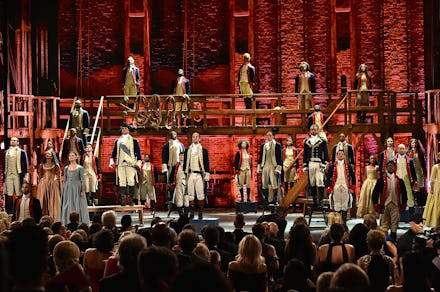In Donald Trump's America, art is more important than ever

Donald Trump has been elected to the presidency of the United States with virtually no checks or balances. The House of Representatives and the Senate are both in Republican hands. Trump will be able to name at least one, if not more, justices to the Supreme Court. A racist, sexist demagogue will have nearly unlimited power.
So what the hell is the point of arts and entertainment?
It's tempting at a time like this to withdraw within yourself, to shut everything out and succumb to helplessness. Watching a movie, going to the theater or listening to music feels like a futile exercise right now, an inevitably unsuccessful attempt to escape the storm clouds barreling down upon us.
But as hard as it is to believe right now, the darkest moment in modern American history, art and the artists who create it are more important than ever. They are a voice and a home for the marginalized groups of this country.
At Mic, we often parse the statistics on how well Hollywood, Broadway, the music industry and other artistic platforms are representing marginalized groups. Often, the news isn't good. There's tremendous work that must be done to better find and boost female and queer voices. People of color remain remarkably under-included both in front of and behind the camera. None of that work goes away because the president-elect is someone who threatens the pillar of democracy; in fact, it becomes all the more vital.
Art is a venue for speaking out against the powerful. Think of the protest anthems from throughout history: Marvin Gaye's "What's Going On" for the civil rights movement, or Helen Reddy's "I Am Woman" for the women's liberation movement. Think of Jimi Hendrix's "Machine Gun," protesting the Vietnam War.
Films like Selma serve as megaphones for artists like Ava DuVernay to say something profound about not just the way we lived when Martin Luther King Jr. was alive, but how we do now when protests break out in places like Ferguson, Missouri. Musicals like Hamilton argue for the power and importance of immigrants at a time when Americans elected a man who wants to build a wall to keep them out.
When hate reveals itself, art counters with brilliance. Art counters with inspiration. Art counters with anger. And art counters with love.
Not one week ago, I published an essay about how art helped me cope with my father's death. Today, I hope it helps me and many others grieve for what the United States is about to become. I hope it helps us process the ugliness Americans revealed within themselves Tuesday night. Most of all, I hope it continues to give voice to the voiceless.
For queer youth, for men and women of color, for trans people, for women of all ages, for people with disabilities, for the poor and for so many other marginalized groups, the United States feels a bit less like home Wednesday morning. Many will threaten to immigrate to other countries. Some may actually do it. Some will choose to stay.
No matter where they go, I hope people use art as both weapon and comfort. I hope they use it as a way to fight back against an administration that has said time and again they are unwanted, and as solace when the future seems too dark to fathom. I hope our greatest artists work harder than ever before, producing masterpieces of fury and self-love.
I believe art is powerful, and I believe it can save us from what will surely be one of the darkest chapters in U.S. history. And so I listen to Les Miserables today, or watch Black-ish, or put Marvin Gaye on loop. It's not a way to deny reality — it's a way to come to grips with it.